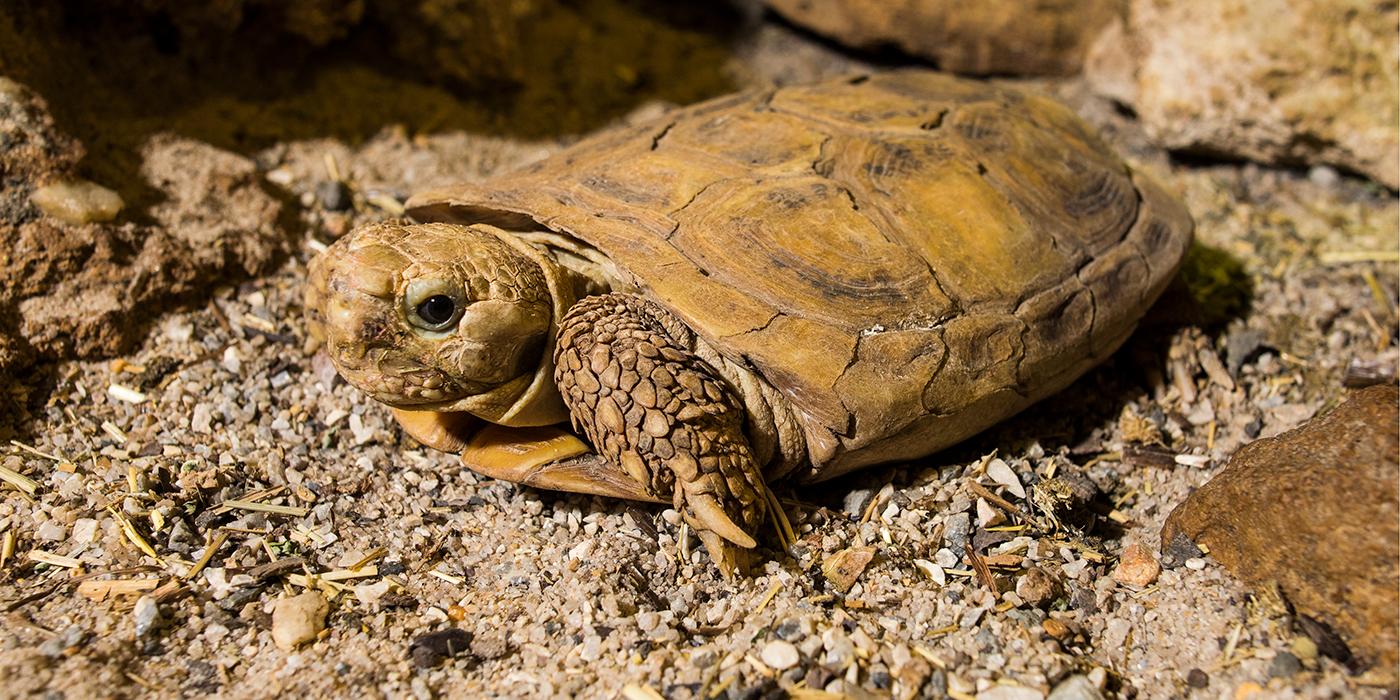Physical Description
Unlike most tortoises that have hard, domed shells, the African pancake tortoise has a thin, flat shell. As a result, the shell (or carapace) does not offer much protection from predators, so pancake tortoises use speed and flexibility to evade danger.
A pancake tortoise's shell is generally different shades of brown with patterns that provide camouflage in their rocky habitat. Its plastron, or belly, is pale yellow, and its head, limbs and tail are generally yellow-brown.
Size
Native Habitat
African pancake tortoises are native to East Africa and are found in Kenya, Tanzania, and Zimbabwe. They inhabit rocky outcrops, called kopjes, or rocky hills in arid thorn scrub and savannah regions. These habitats are generally 30 to 1,800 meters (100 to 6,000 feet) above sea level.
Pancake tortoises spend most of their time in crevices in the rocky hillsides. They are generally solitary, but crevices may be occupied by pairs or sometimes small groups.
Lifespan
They can live for more than 30 years.
Food/Eating Habits
Dry grasses and vegetation, including succulents, make up the bulk of a pancake tortoise’s diet in the wild. They may also eat seeds, nuts and sometimes insects. Pancake tortoises seem to get most of their water from the foods they eat, a survival trait in their natural environment.
At the Zoo, they eat a mixture of leafy greens and pellets.
Reproduction and Development
Mating occurs throughout the year, but the peak of mating season occurs in January and February. Males fight for the opportunity to mate with females. Therefore, larger males tend to have the most chances to breed.
Nesting tends to occur in late spring and early summer. Females dig nests in loose soil or lay their eggs in a crevice. They only lay one egg at a time, but may lay many throughout the nesting season. Their incubation period lasts four to six months.
Conservation Efforts
Assessed in 1996 by the IUCN and listed as Vulnerable. CITES Appendix II.
Collection for the pet trade is the largest threat to the continued survival of African pancake tortoises in the wild. Because of their unique appearance combined with their small size, these tortoises are highly desired for private hobbyists. Additionally, because of their highly specific habitat, pancake tortoises are sensitive to habitat destruction. Slash-and-burn shifting cultivation for agriculture, and charcoal burning have decreased the amount of suitable habitat for African pancake tortoises.
Breeding programs are now in place to prevent wild caught pancake tortoises from entering the pet trade. International education about tortoises and the pet trade is needed in order to circumvent illegal exportation. African pancake tortoises are also protected in the Serengeti National Park.Assessed in 1996 by the IUCN and listed as Vulnerable. CITES Appendix II.
Help this Species
Practice ecotourism by being an advocate for the environment when you’re on vacation. During your travels, support, visit or volunteer with organizations that protect wildlife. Shop smart too! Avoid buying products made from animals, which could support poaching and the illegal wildlife trade.
Choose your pets wisely, and do your research before bringing an animal home. Exotic animals don’t always make great pets. Many require special care and live for a long time. Tropical reptiles and small mammals are often traded internationally and may be victims of the illegal pet trade. Never release animals that have been kept as pets into the wild.
Share the story of this animal with others. Simply raising awareness about this species can contribute to its overall protection.
Animal News

#DCPandas: Happy 4th Birthday, Qing Bao! ›

Canada Lynx Have Arrived at the Smithsonian’s National Zoo ›



